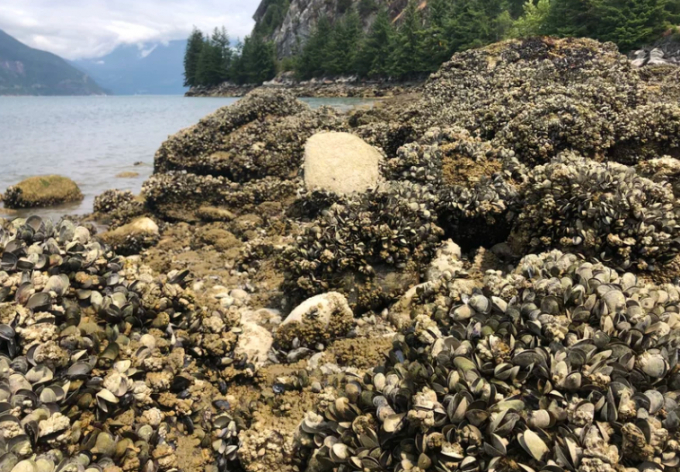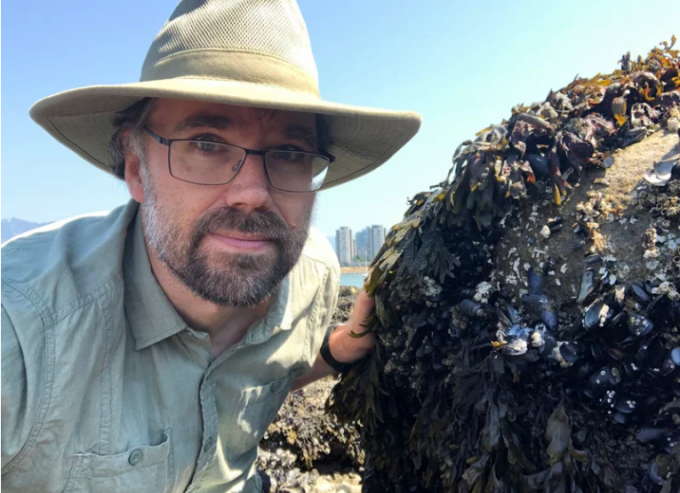November 28, 2025 | 00:46 GMT +7
November 28, 2025 | 00:46 GMT +7
Hotline: 0913.378.918
November 28, 2025 | 00:46 GMT +7
Hotline: 0913.378.918

Marine biologist Christopher Harley from the University of British Columbia says he has found hundreds of thousands of dead mussels on one beach alone. Photo: University of British Columbia
But that number is likely to be much higher, said professor Christopher Harley from the University of British Columbia.
"I've been working in the Pacific Northwest for most of the past 25 years, and I have not seen anything like this here," he said. "This is far more extensive than anything I've ever seen."
Harley reaches his estimates by counting the number of sea creatures, mostly mussels, in a section that he said is representative of an entire beach. He varies measuring some beaches that are rocky and some that are not to get a full estimate for the entire ecosystem.
"This is a preliminary estimate based on good data, but I'm honestly worried that it's a substantial underestimate," Harley told NPR from a beach in British Columbia, where he continues to survey the casualties from the most recent heat wave.
"I'm also looking for all these dead barnacles. I've been hearing from people about dead clams and crabs and intertidal anemones and sea stars. And once you really start factoring in all these different species, it's been a huge catastrophe for marine life," he said.
Though heat waves have affected marine life in the past, Harley said temperatures reaching more than 100 degrees Fahrenheit like they did last weekend in the Pacific Northwest are "exceptionally rare." But with climate change, he's seen estimates from other scientists that similar heat waves could start occurring once every five to 10 years.
"If it happens that frequently, the system won't have time to recover in between the die-offs," he said.
The die-off could have ripple effects beyond the shore
Malin Pinsky, an associate professor of marine biology at Rutgers University, said the extreme heat contributes to a "massive reorganization of ocean life."
"Species are shifting towards the poles of the Earth at about 60 kilometers [37 miles] per decade, and it doesn't happen slowly, bit by bit. It often happens in these extreme events, where a large population of something like mussels can die," Pinsky said.
But the overarching problem, marine biologists point out, is that the impact of climate change on the oceans is still treated as out of mind, out of sight. Pinsky also agrees that Harley's estimate of 1 billion creatures dead is likely an undercount.

Harley has been tracking mussels and other sea creatures in the aftermath of the heat wave that hit the Pacific Northwest. Photo: University of British Columbia
"The craziest thing is that it's just the tip of the iceberg," Pinksy said. "We can see the mussels because they're on the shoreline, but to a large extent, oceans are out of sight, out of mind, so we're likely to learn the magnitude of what's happening only much later."
That many sea creatures dying at once not only affects ocean life but terrestrial creatures as well — from birds who feed on sea life to humans running fisheries and consuming seafood.
"[Mussels] are what's known as a foundation species because a lot of the ecosystem depends upon them ... so losing the mussel bed would be losing all the apartment buildings in a city core," Harley said.
In the meantime, he's is still counting dead mussels on the seashore. On Thursday, from Porteau Cove, just north of Vancouver, he estimated 600,000 dead mussels in 164 feet of beach — a distance Harley said he can walk in a minute.
"Not every shore will be this bad, but this is a fair amount worse than I was expecting," he said.
(NPR.org)

(VAN) A new study reveals how the simultaneous effects of ocean acidification, salinity and loss of oxygen are making the world more fragile.

(VAN) Hopes are growing that the creation of the first 3D turkey gut model could be a turning point in the battle against the virulent blackhead disease.

(VAN) Tyson, America’s biggest meat supplier, plans to shutter one of its largest beef processing plants as the industry continues to struggle with low cattle supplies and political pressure from Washington.

(VAN) New FAO study shows how digital solutions are empowering farmers and fishers to prevent losses and build resilient agrifood systems.

(VAN) Brazil's COP30 presidency pushed through a compromise climate deal on Saturday that would boost finance for poor nations coping with global warming but that omitted any mention of the fossil fuels driving it.

(VAN) Poultry farmers in the UK have been warned that they could face one of the worst winters yet for bird flu.

(VAN) Prices of main-crop paddy have risen sharply, with jasmine rice hitting 16,100 baht per tonne — the highest level in years.